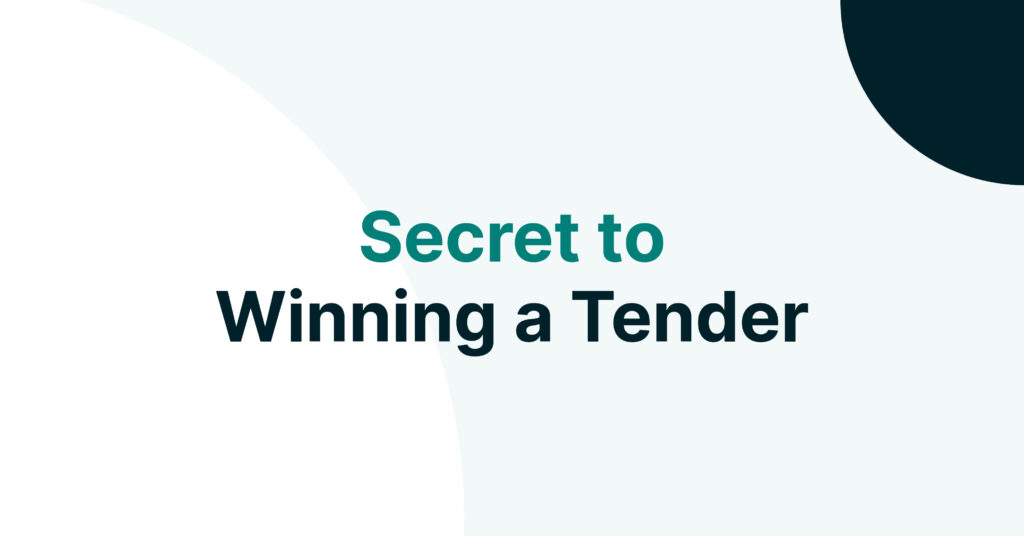How to tender for contracts… and win
How to tender and win contracts for your business
Do you want to know how to tender for work?
Tendering for work can open many doors for your business. When done successfully, it can win you contracts, create relationships and, ultimately, generate a profit.
However, not just anyone can write a winning bid. Learning how to tender for work takes time, effort and resources.
Keep reading to find out how to tender for work – and win contracts for your business!
What is tendering?
Let’s start simple. If you’ve never tendered for work before, you might be wondering, ‘what is a tender’?
A tender is a written request that is sent out to potential suppliers. A buyer will release an invitation to tender (ITT) when they want to outsource a service or solution to suppliers.
When you tender for work, you have to submit a tender response. This is where you show the buyer that your company is the best choice for the contract. You have to demonstrate that you meet their criteria in your response. The buyer will evaluate your response as part of the tendering process. After they have evaluated the responses, they’ll pick the supplier who best suits their needs.
What are the benefits of tendering for work?
There are many benefits of learning how to tender for work. It goes without saying that tendering for work will help your business generate a profit and secure work. But what other benefits are there?
Learning how to tender can lead to a guaranteed workload for your business. If you secure a place on a framework agreement or Dynamic Purchasing System (DPS), you’ll become an approved supplier. This gives you a better chance of securing work. These systems are particularly beneficial to your business, as they can run for years at a time.
When you win a single-supplier contract, you are guaranteed to deliver the work and be paid. However, it’s important to note that this only applies to public sector contracts. Organisations in the private sector are not bound by the same contractual agreements.
If you’re a small or medium-sized enterprise (SME), then learning how to tender could really benefit your business. The UK government aims to spend £1 in every £3 on SMEs. So, you have a great chance of winning public sector contracts!
How do you actually tender for work?
So, now you know what tendering is and understand its benefits. But how do you actually tender for work?
If you’re wondering how to tender and win contracts, then let’s break down the process.
- Choose a suitable contract for your business
When learning how to tender, you need to decide which contracts your company should be bidding for.
Only bid on contracts that you have a chance of winning. Otherwise, you’ll be wasting your company’s time, effort and resources. All of which are invaluable to running your business.
How do you know which contracts are suitable for your company?
There are certain factors you need to consider when choosing a contract:
- The size of your company
- Your company’s turnover
- The goals of your business
- The amount of work involved in the contract.
Generally speaking, you should avoid bidding for contracts with a value of more than half your turnover.
You also need to make sure that your experience is relevant and meets the buyer’s requirements. If the buyer is asking for three relevant case studies, that’s what you need to provide them with. Without the appropriate evidence, you’re unlikely to win the contract. And your company’s resources will just go to waste!
- Register your interest in the tendering opportunity
The next step of learning how to tender for contracts is to register your interest in your chosen opportunity.
You’ll need to register your interest on the buyer’s portal. This usually requires you to enter some details about your company. Once you’ve completed that step, you’ll be able to view the tender documents.
- Break down the tender document
If you want to know how to tender and win contracts, it’s crucial that you break down the tender documents.
Before you actually proceed with the bid, you need to carefully read through the buyer’s specifications. This is important because you need to know exactly what you’re up against.
You need to understand the buyer’s criteria to make sure the tender is suitable for your company. Not only that, but you also need to make sure the contract meets your expectations.
It’s no good submitting a tender for a contract that you can’t deliver.
It’s important to break the documents down before you write the bid. You don’t want to be halfway through your tender response and realise you aren’t eligible for the contract.
- Gather your evidence
The buyer will want prospective suppliers to demonstrate how they will deliver the contract. It’s not enough to tell them what you’re going to: show them how you’re going to do it. The buyer needs to see evidence that you have successfully delivered work in the past. That’s why, when learning how to tender for work, you need to gather your evidence.
To make sure you’re submitting the right evidence, you should contact current clients and ask for testimonials. A positive testimonial will impress the buyer – they’ll be confident that your company has been successful in the past.
Also, remember to adapt your case studies to suit the buyer’s specific needs. Don’t assume that every buyer wants to see the same evidence.
The buyer might ask to see other documents such as:
- Company accounts
- Staff CVs
- Policies and procedures
- Accreditations or proof of registration.
- Write your tender response
The next step of learning how to tender for work is actually writing your response.
As you can imagine, this step is huge. Your tender response is a crucial part of the buyer’s evaluation process. So, you need to make sure that the work you produce is of an incredibly high standard. If yours isn’t, then your competitors will be!
A key part of learning how to tender is choosing the appropriate tone, style and voice for your response. You need to be formal, assertive and appear confident in your work. If you sound hesitant in your response, the buyer won’t be impressed. It could even cost you the contract.
You also need your writing to be clear and focused. Make sure your answers are concise and direct. Don’t make the buyer search for your answer – just give it to them!
Lastly, you need to consider the word count. You can work out how much detail is required of you from the word allowance. If the buyer is asking for 2000 words, a 500-word answer won’t cut it. They’ll assume that your company isn’t capable of delivering the contract. Similarly, going over the word count won’t impress the buyer either. They might even think you are unable to follow instructions.
- Thoroughly proofread your work
When learning how to tender for work, this next step is often overlooked. However, it’s absolutely vital to your tendering success. You need to proofread your work – thoroughly!
It’s easy to miss errors in our own work. And everyone makes mistakes, especially when working with large documents. However, submitting a tender response full of mistakes will not win you contracts. So, you need to carefully proofread and edit your work before the submission date.
Submitting a response full of mistakes will lose you marks in the evaluation process. It suggests to the buyer that you don’t pay attention to details. And it doesn’t look very professional!
You should ask someone else to proofread the document for you. They’ll be reading the document with a fresh pair of eyes, so they might spot mistakes that you didn’t see.
- Submit the tender
Now you know how to tender for work, it’s time for the final step: submitting the bid.
It’s important that you leave yourself plenty of time to submit the tender. Don’t leave it to the last minute. Not only will this cause you unnecessary stress, but you could end up missing the deadline altogether. Then all of your hard work will have been for nothing!
Anything else we can help with?
If you have any more questions like ‘how to tender’, then Tender VLE will have the answer.
Join the UK’s first ever virtual learning environment to offer a whole range of free tender-related videos. Whether you have years of tendering experience or are starting out from scratch, Tender VLE will have something for you.
Think there’s something missing? If you can’t find the video you’re looking for, then tell us more about the content you’d like to see!
See something you like? Contact our team for a quick chat and start your Tender VLE journey today.
Do you need help with a tender? Hudson Succeed can help!
If you’re still wondering how to tender for work, then don’t worry! Hudson Succeed is here to help.
We’re a global provider of bid writing services. We have an 87% success rate and over 60 years of collective bid writing experience. If you want to write a winning bid, then you’ve come to the right place.
We offer services that will help you secure tendering opportunities for your business. Our expert Bid Writing Team can help you with:
A 4-week programme designed to introduce you to the tendering process. One of our highly skilled Bid Writers will work with you to make sure your business is ready to tender.
Have you tendered before but are yet to see the benefits of your efforts? Tender Improvement is designed for you. One of our Bid Writers will review your previous tender responses and work to improve them for further tender submissions.
Choose Tender Writing if you want the whole package. All we need from you is information about your company – then we’ll do the rest. From writing through to submission, a member of our Bid Writing Team will take care of it all.
If you’ve written your tender responses and just want a fresh perspective, then Tender Mentor is the package for you. A member of our team will proofread your tender responses, checking for inconsistencies, grammar or spelling errors. We’ll also check your responses to make sure they meet the contract’s specifications. Just ask a member of our Bid Writing Team!
Get in touch with one of our expert Bid Writers and watch your company grow.
Why not try Discover Elite?
There’s even more on offer with Discover Elite.
Upgrade your tendering experience with Discover Elite and take the next step to success.
Contact our team to find out more.








